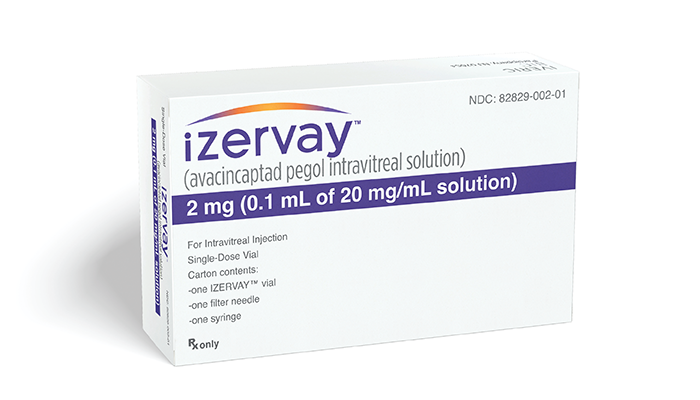
Erin Henry (Images supplied by Iveric Bio.)
What exactly is Izervay?
Izervay (avacincaptad pegol intravitreal solution) is a pegylated RNA aptamer with a unique mechanism of action: it targets the C5 level of the complement cascade to reduce inflammation and cell death, which we believe is associated with the progression of geographic atrophy (GA). It’s the only molecule that has shown a statistically significant reduction in GA growth in one year; relative to our control arm at 12 months, both our GATHER1 and GATHER2 trials showed a statistical reduction for the Izervay-treated patients. We also were able to see the treatment effect as early as six months.
In August 2023, Izervay received US FDA approval for the treatment of GA secondary to age-related macular degeneration (AMD). We are now working to bring about the product’s global development.
How can Izervay address the unmet medical needs of GA patients?
We didn’t have any treatment options for GA until 2023, and there is a large unmet need – over 8 million patients worldwide, many of which we believe may not even be aware of the diagnosis, let alone that there may be treatment options available. So, it’s incredibly meaningful to be able to bring these therapies forward and to be able to slow the trajectory of GA. On average, GA patients start to have visual symptoms within two-and-a-half years of diagnosis. The majority of those patients will eventually lose their ability to drive, so anything we can do to give them more time really is meaningful.
How do you plan to educate ophthalmologists and patients about the treatment?
As I mentioned, we received FDA approval in the US in August 2023; the drug was commercially available just a few weeks later, so we are already seeing adoption. In terms of early considerations for clinical practice, we’re continuing to share through other venues the data from the GATHER2 results that we presented at the American Academy of Ophthalmology (AAO) meeting in November 2023. Combining that with the reports we’re now getting from practicing clinicians, we’ll continue to educate the eye care community about these early experiences of using Izervay. People will want to know, of course, that the clinical trial results are being mirrored with the real-world experience.
Education is particularly important for a disease that hasn’t had a treatment until now. We have a plan to promote disease education through a number of different avenues, both for referring and treating physicians. We have a website – izervayecp.com – for eye care professionals and treating physicians to understand the product and learn more about the early detection and diagnosis of GA. In the US, we also have an educational campaign for patients called “More to See.” These approaches complement the educational efforts we’re pursuing through healthcare medical conferences and the peer-reviewed publication pathway.
How is Izervay administered to the patient?
Izervay is an intravitreal injection, similar to anti-VEGF agents; these tend to be administered in most countries by a retina specialist. So, it’s similar to the standard intravitreal injection for treatments for wet AMD, diabetic macular edema (DME), or retinal vein occlusion (RVO). Intravitreal injection is a good route for targeted drug delivery as it concentrates the drug where it’s needed in the eye and minimizes the risk of systemic side effects.
Through clinical trials, we’ve seen that patients are willing to come in for frequent injections – this is an incredibly motivated patient population.
And until now, treating GA has been a case of just managing expectations for GA patients…
Absolutely. And we’ve had a lot of discussions with retina specialists about that. How do you convey realistic expectations to the patients? A patient shouldn’t start treatment expecting their vision to be restored. One of the challenges – but also one of the opportunities – of this disease is that, unlike the conditions treated with anti-VEGFs, GA is more like neurodegenerative diseases, such as Alzheimer’s and Parkinson’s, where the goal is to give the patient more time seeing, more time driving, more time being independent. Knowing that is critical to feeling that the treatment is worthwhile and to keep patients adherent to the treatment.
Are there any other potential indications for Izervay?
Certainly, we have a robust effort on GA, but we’re also exploring the use of Izervay for Stargardt Disease. We have a large phase II study ongoing – the STAR study – in which we’re looking to see where the treatment can benefit patients outside of GA.
Erin Henry is VP, Product Strategy & Innovation at Iveric Bio, and Asset Lead for ACP (avacincaptad pegol).

